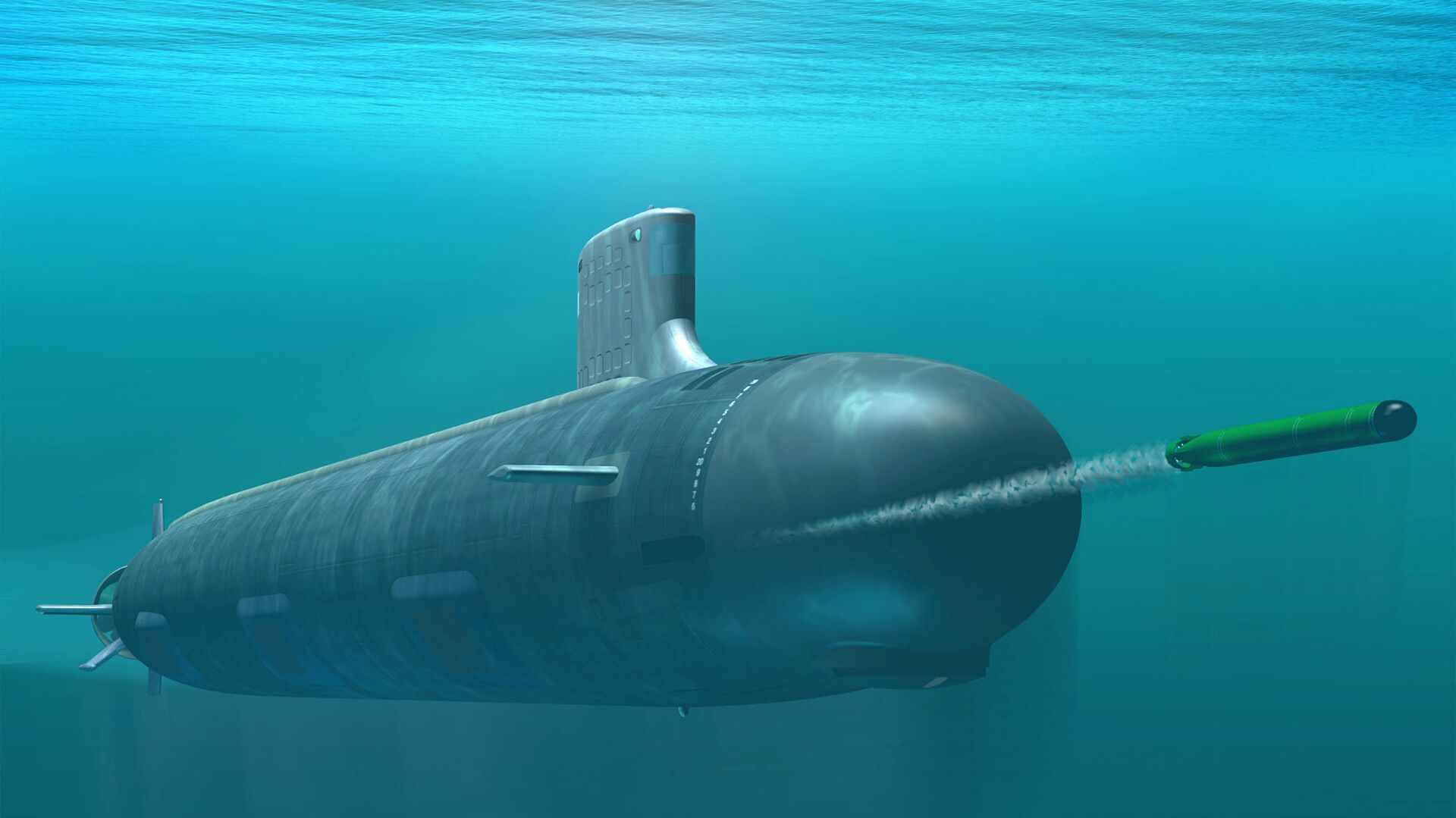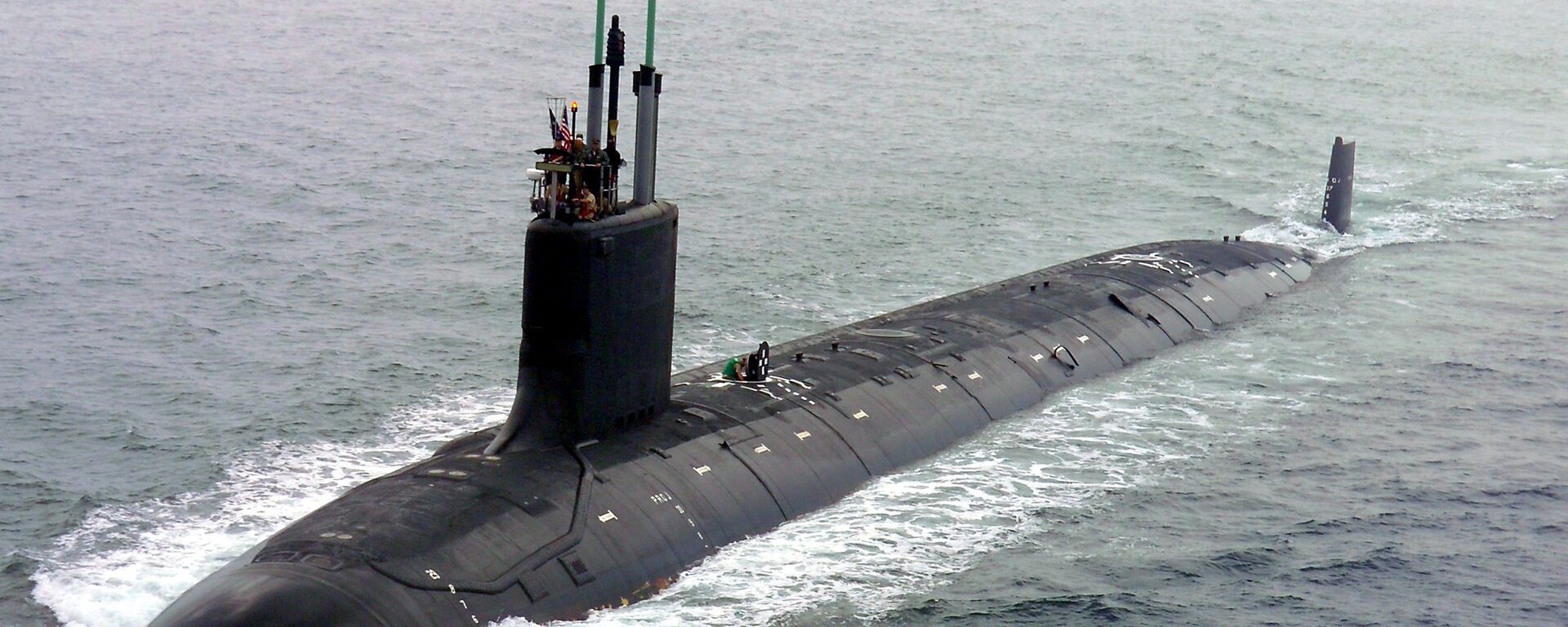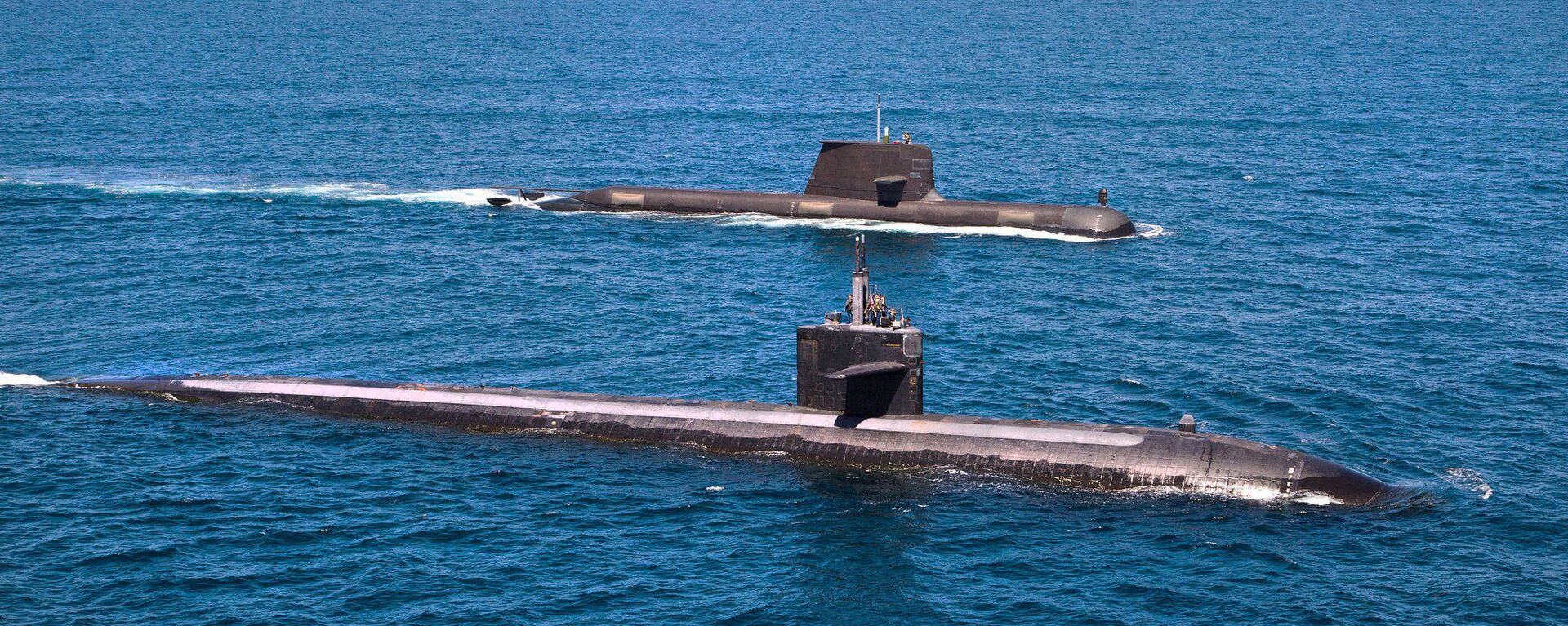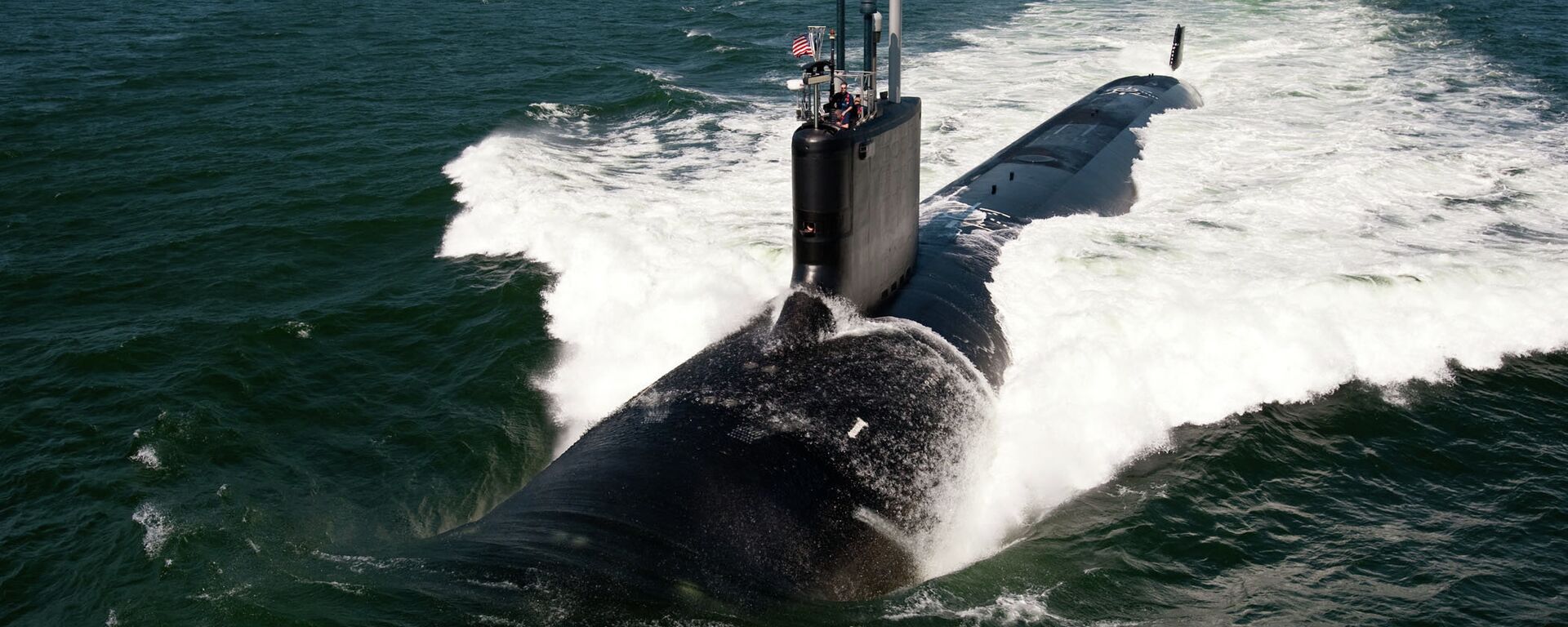Australia 'Pukes Up its Independence' by Purchasing US Nuclear Submarines, Says Scholar
18:08 GMT 13.03.2023 (Updated: 18:40 GMT 13.03.2023)
Subscribe
Australia is preparing to announce its intent to purchase several nuclear submarines, media reports suggest.
This development comes less than two years after the establishment of AUKUS, a trilateral military pact between the US, UK and Australia, which appears to be aimed at containing China.
Professor Joe Siracusa, US political expert and dean of global futures at Australia's Curtin University, shared his thoughts on the matter with Sputnik, providing his opinion on how this move may affect Australia and the nuclear non-proliferation treaty, and whether these vessels might pose a threat to China.
Sputnik: Washington and other allied capitals have been abuzz with talk of nuclear submarines since the surprise announcement of AUKUS' creation in September. The new agreement has been met with adulation from the US foreign policy establishment - but what's behind the big words? How likely is AUKUS to deliver nuclear submarines anytime soon?
Prof. Joe Siracusa: I think it's a bit of an illusion. I mean, the Australians are really happy to get on board this. They're committed to pay about $200 billion over a 30-year period. And I doubt they're going to receive more than one or two submarines.
Prof. Joe Siracusa: I think it's a bit of an illusion. I mean, the Australians are really happy to get on board this. They're committed to pay about $200 billion over a 30-year period. And I doubt they're going to receive more than one or two submarines.
They're going to be these "Virginia" class submarines, which supposedly are going to be built in Australia, which require thousands of people in the industrial base.
They're going to have to train thousands of young men and women to serve on these submarines. I mean, it'll be years and years. But Australia thinks it's acquired sort of a magical weapon, the kind the British had with the Dreadnoughts before the First World War.
There's something magical about it. Well actually, there isn't. The Americans will be patrolling the western part of Australia until these ships can come online. They’ll probably initially be used, "Virginia" class submarines, and it's not going to be newish.
And the Americans have control over the nuclear propulsion. And then Australians say they're in charge of the sovereignty of the ship. So I've been pointing out today to different people that if you got multinational groups on board a boat and the captain makes a decision to start a war or to engage in combat, there's no discussion. I mean, these ships to me are a very bad choice by Australia. They think they've bought some security.
And the Americans have control over the nuclear propulsion. And then Australians say they're in charge of the sovereignty of the ship. So I've been pointing out today to different people that if you got multinational groups on board a boat and the captain makes a decision to start a war or to engage in combat, there's no discussion. I mean, these ships to me are a very bad choice by Australia. They think they've bought some security.
Maybe in the short term it gives them some peace of mind. But there's just no way that this acquisition, even if it ever comes true, is going to stop anybody from doing anything else. You know, generally, selling the Australians nuclear weapons, it's a bit of a con job.
The Australian government isn't going to tell their own people what they cost when they're talking about percentage of GNP in the years that go forward. It's kind of like a Ponzi scheme. I'm going to sell you a great nuclear-powered submarine. I'm not going to tell you exactly what I'm going to deliver it and you're going to be paying for it over 30 years.
And all the people who've organized this aren't even going to be alive to see it done, you know. They'll either be out of office or they're going to be dead. And so, the Australians are buying a lot of hope here. To me, this suggests a great deal of ignorance, as though these ships would be enough to frighten China. The Chinese, the PLA Navy is not going to lose any sleep tonight over these discussions. Australians have given up something else for the Americans.
And all the people who've organized this aren't even going to be alive to see it done, you know. They'll either be out of office or they're going to be dead. And so, the Australians are buying a lot of hope here. To me, this suggests a great deal of ignorance, as though these ships would be enough to frighten China. The Chinese, the PLA Navy is not going to lose any sleep tonight over these discussions. Australians have given up something else for the Americans.
The Australians think they are leaders in the world of international nuclear nonproliferation. But by acquiring these nuclear-powered submarines, they've broken the spirit and letter of the Nuclear Nonproliferation Treaty. And the United States knows this, the Chinese government has correctly objected to this at the International Atomic Energy Agency in Vienna.
In exchange for breaking the record of international cooperation on nuclear nonproliferation, they're not even going to get a weapon for years and years. And by that time, maybe the leadership in Beijing will change. I mean, the world will have changed. It's extraordinary what they think they've bought into.
Sputnik: What are the implications of the AUKUS deal for nuclear non-proliferation?
Prof. Joe Siracusa: The Chinese have said quite clearly in interviews with Australians over the last couple of months that they now regard Australia as a nuclear target because Australia is no longer a nuclear weapons-free zone, that is, the Southwest Pacific.
Sputnik: What are the implications of the AUKUS deal for nuclear non-proliferation?
Prof. Joe Siracusa: The Chinese have said quite clearly in interviews with Australians over the last couple of months that they now regard Australia as a nuclear target because Australia is no longer a nuclear weapons-free zone, that is, the Southwest Pacific.
So, one of the results is that the Chinese said they will now target Australia with nuclear weapons when the time comes... I mean, Australia has lost its reputation and the Chinese are very angry at Australia and China sees Australia as simply playing in with the Americans as part of this containment policy. So Australia is not going to move forward in the area of improving diplomacy with the Chinese.
This is going to put them on the back foot and, of course, the Australians are very dependent on the Chinese to buy their coal and their iron ore and send their international students. I think Australia is going to pay a very heavy economic price to the Chinese as a result of this.
Sputnik: Do you believe AUKUS can be a “silver bullet” when it comes to the Chinese maritime challenge?
Prof. Joe Siracusa: Australia would just be part of a group of American and British ships. Canberra, the capital of Australia, is 10,000 miles to Washington and nearly 11,000 miles to London. Beijing is about 5,000 miles. If Australia plies the high seas or goes on patrol in the South China Sea or in the Taiwan Strait, it's far, far away from protecting the lines of communication here or in the homeland.
Sputnik: Do you believe AUKUS can be a “silver bullet” when it comes to the Chinese maritime challenge?
Prof. Joe Siracusa: Australia would just be part of a group of American and British ships. Canberra, the capital of Australia, is 10,000 miles to Washington and nearly 11,000 miles to London. Beijing is about 5,000 miles. If Australia plies the high seas or goes on patrol in the South China Sea or in the Taiwan Strait, it's far, far away from protecting the lines of communication here or in the homeland.
Keep in mind that the parameters of Australia is 12,500 miles in its perimeter; and that's the distance between Sydney and London via Suez Canal. They don't have enough surface ships, they don't have enough anything to protect the country. This country is pretty vulnerable, as a matter of fact. So buying security here is a bit of an illusion.
What I don't like is this: they reckon that for years that Australians would be part of American personnel on these ships. So you're going to have these mixed nationalities on these ships and of course, Australians are not going to be telling American captains not to fire or not to start a war, or not to engage the enemy wherever the enemy is.
What I don't like is this: they reckon that for years that Australians would be part of American personnel on these ships. So you're going to have these mixed nationalities on these ships and of course, Australians are not going to be telling American captains not to fire or not to start a war, or not to engage the enemy wherever the enemy is.
Australia has sort of devolved its sovereignty. They sort of puked up their independence by buying these things. They're not becoming more independent or more self-reliant, they become completely dependent now on the decision of the United States when they’re taking them into war.
And of course, this idea of containing China with these ships is also an illusion, because it's just Britain, which is a declining empire, the United States, which is a declining great power, and Australia, which has got about 26 million people on a good day.
And of course, this idea of containing China with these ships is also an illusion, because it's just Britain, which is a declining empire, the United States, which is a declining great power, and Australia, which has got about 26 million people on a good day.
I mean, these three nations cannot contain anybody between the three of them, as a matter of fact, and the nations that they'll be dealing with in the Pacific area, they've lived with China for thousands of years.
They're not going to choose between Beijing and Washington. They're going to try to remain as neutral as possible. So I think the Australians have given up a great deal for very, very little. And this is not a "silver bullet". It's not going to solve any problems. If anything, it complicates Australia's security needs.
Sputnik: To what extent, in your view, will the US be able to keep to its commitments given the already existing production issues?
Prof. Joe Siracusa: This is very interesting. They keep saying that this is not going to be a burden on American boatyards. I've been following this like everybody else, these American boatyards claim they can build between 1.6 and 2.2 "Virginia" class submarines every year.
Sputnik: To what extent, in your view, will the US be able to keep to its commitments given the already existing production issues?
Prof. Joe Siracusa: This is very interesting. They keep saying that this is not going to be a burden on American boatyards. I've been following this like everybody else, these American boatyards claim they can build between 1.6 and 2.2 "Virginia" class submarines every year.
There are about 23 more to go on the books. Australia wants five submarines from the United States. They're not going to get new ones, they're going to get used ones; they’re going to get the ones the Americans discard, probably.
And then the Australians are going to build another three or four submarines with a British design and American technology here in Australia, in Adelaide. They expect thousands and thousands of jobs. This is never going to materialize.
I've heard that in the past, a lot of Australian submarines have been sidelined because they can't get enough Australians to serve as submariners. They can't pass a psychology test. Australians aren't used to being cooped up in submarines. They're not a great maritime nation. They're a great war-fighting nation.
I've heard that in the past, a lot of Australian submarines have been sidelined because they can't get enough Australians to serve as submariners. They can't pass a psychology test. Australians aren't used to being cooped up in submarines. They're not a great maritime nation. They're a great war-fighting nation.
If Australia is remembered for anything, it's remembered for its army and a little bit for its air force, but not for its navy, it's not a great sea power and it doesn't have that great tradition. I think they bought themselves a white elephant here, for all this money.
And of course, to do this they had to break a contract with the French on diesel submarines. And that cost them about, I think, $380 million to break the contract and a great deal of travail with Macron, etc.
I think Australians haven't thought very clearly about this, and I must say this too: I've been here 50 years, I'm 78 years old and Australia has not produced any deep thinkers or grand design or grand strategy people.
I think Australians haven't thought very clearly about this, and I must say this too: I've been here 50 years, I'm 78 years old and Australia has not produced any deep thinkers or grand design or grand strategy people.
They are not thinking in terms of the big picture, they're thinking in terms of the short term, they're thinking in terms of jobs for people, they're thinking in terms of joining the Americans, because it's the easiest thing to do. I mean, Australia is not really stretching its independence there very much.
They're just siding up with the Americans and of course, the Americans as a result of this, they're going to be doing more patrols. They're going to have more rotational groups here in Australia. They're going to have more American troops on Australian soil, B-52 bombers and all the rest of it.
And sure, Australia has become what it always has been, sort of an aircraft carrier for the United States, this beautiful continent in the middle of nowhere where the United States can then work from.
And sure, Australia has become what it always has been, sort of an aircraft carrier for the United States, this beautiful continent in the middle of nowhere where the United States can then work from.
I don't think this AUKUS has solved any problems. I woke up one day and saw on television here that we had the British prime minister, Boris Johnson, and we had Scott Morrison, the Australian prime minister, and we had Joe Biden talking about this new arrangement.
This was not discussed in Australian politics. This is a decision made by seven people in a room on a Sunday afternoon about which way to take the country. And this upsets a lot of people. I'm willing to bet that there is a lot of blowback on this.
It's going to boomerang on the Australian politicians. There are going to be a whole lot of people who don't want to pay this kind of money for very dubious protection in the future. There's going to be a lot of pushback. At the end of the day, the Australians are probably going to regret this. In the short term they’ve bought themselves a little bit of happiness.
It's going to boomerang on the Australian politicians. There are going to be a whole lot of people who don't want to pay this kind of money for very dubious protection in the future. There's going to be a lot of pushback. At the end of the day, the Australians are probably going to regret this. In the short term they’ve bought themselves a little bit of happiness.
People are really excited about this. They don't know what it's going to cost. They don't know when these ships are going to arrive and they don't know what they do. These are attack submarines, and who are they going to attack? I mean, are these aimed against China?
China is not going to attack anybody unless they are attacked. And my fear is this: there's so much ignorance about great power politics in this neck of the woods that Australia is going to get themselves involved in a fight in which they cannot get out of. So I think they have gone into this blindly.
Sputnik: Do you expect other countries to follow in the footsteps of AUKUS and create their own nuclear submarine alliances?
Prof. Joe Siracusa: I don't think anyone's going to follow these footsteps. In fact, I think the AUKUS arrangement will be a cautionary tale for other nations on what to avoid.
Sputnik: Do you expect other countries to follow in the footsteps of AUKUS and create their own nuclear submarine alliances?
Prof. Joe Siracusa: I don't think anyone's going to follow these footsteps. In fact, I think the AUKUS arrangement will be a cautionary tale for other nations on what to avoid.





